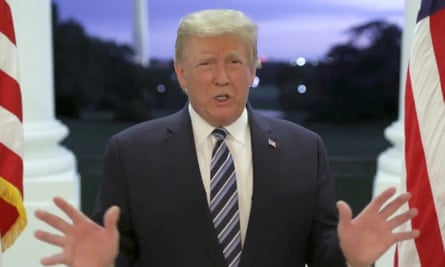Extract from The Guardian
Not only did he not fear Covid-19, but he didn’t fear passing it on to everyone in his vicinity. That’s not bravery, it’s sociopathy.

Last modified on Wed 7 Oct 2020 06.47 AEDT
Donald Trump feels great, apparently. On Monday, he enthusiastically tweeted that he would be leaving Walter Reed Hospital in the evening and that he felt “better than I did 20 years ago.” Trump then told Americans: “Don’t be afraid of Covid. Don’t let it dominate your life.” The message is clear: he has it and he’s fine, so why should the rest of us worry? Trump’s illness perhaps ought to have been a sobering moment that made him reevaluate his irresponsibility and carelessness. But this is Trump, so of course the message is “actually, Covid isn’t that serious.”
For him, maybe. But not all Americans are fortunate enough to have access to world-class socialized healthcare at the finest government hospitals. Trump has gotten the best medical care imaginable, with every necessary resource of the public and private sector being put towards keeping him alive. After testing positive, Trump was soon given an experimental antibody treatment called Regeneron, the CEO of the company being an old golf club buddy of Trump’s. The company admitted that the president was given special care, treating it as a no-brainer that the president automatically gets to skip to the front of the line.
Some might think it fair and necessary for the president to get whatever he wants, but it does make it particularly galling that Trump and his supporters are treating his continued survival as proof of his unique strength and Covid-19’s weakness. Louisiana senator John Kennedy said Trump’s case showed that the virus is “not nearly as lethal as the experts told us it would be.” Georgia senator Kelly Loeffler tweeted a video of Trump wrestling a coronavirus to the ground, and Florida representative Matt Gaetz made a Chuck Norris style joke about the virus needing to recover from its encounter with Trump.
Suggesting that Trump’s survival reflects well on him, though, implies that the 200,000 Americans who have died from Covid-19 simply did not share Trump’s strength. It reinforces the ugly Trumpian worldview that those who suffer are “losers” and those who prosper are “winners.” Trump subscribes to an almost pure Social Darwinism, in which dominance is virtue. He takes this to its most absurd logical extreme, as when he suggested that being tortured reflected badly on John McCain and soldiers who die in wars are losers and suckers.
This explains why Trump is so desperate to leave the hospital, keeps insisting so loudly that he is feeling great, is keeping actual details of his illness murky, and is willing to perform ludicrous risky publicity stunts like having his driver take him out to wave at fans. Trump gleefully quoted a columnist who said he would be an “invincible hero” if he comes back onto the campaign trail looking strong. If Trump admitted that he felt like crap, and showed any sign of being ill, he would be confessing to be a loser rather than a hero. If strength is virtue, any sign of weakness would destroy his entire brand. “I like presidents who don’t get Covid-19,” a person with the Trumpian mindset might think.
Assuming Trump is indeed not suffering too much, and that his experience with the virus is not too difficult going forward, the main lesson to be learned is that when you have good medical care, it makes it easier to survive debilitating illnesses. Coronavirus hits poor people and people of color very hard, and the pandemic-caused recession led to millions losing their health insurance. Many of the people who have caught coronavirus have indeed been heroes, risking their lives in the service of others—though some are forced into the role involuntarily by economic necessity. But they have not been invincible, for the simple reason that Covid-19 is a deadly virus that cannot be stopped through willpower and tweets.
Donald Trump’s “don’t fear Covid” attitude has not only led to his own contraction of the disease, but has caused a giant outbreak among high-ranking Republicans. It’s not easy to feel much sympathy for such people, because they ignored and scoffed at public health experts. The White House housekeepers who have contracted Covid-19, however, did not ask for this. Donald Trump simply does not care about their health and well-being, just as he doesn’t care for that of his Secret Service agents. Not only did he not fear Covid-19, but he didn’t fear passing it on everyone in his vicinity. That’s not bravery, it’s sociopathy.
Even though Trump’s illness is clear proof that he was foolish and irresponsible, he will try to turn it into proof that he was right, that there was no need for masks and everyone should go about their business as normal. Of course, he can only say this because, as the president, he gets well taken care of by a giant staff of people who risk their lives to preserve his own. But Trump has never shown any sign of noticing or caring about other people’s struggles. His post-infection attitude is going to be an even more aggressive form of denialism about the immense suffering that his incompetence has caused.
Nathan Robinson is a Guardian US columnist
No comments:
Post a Comment